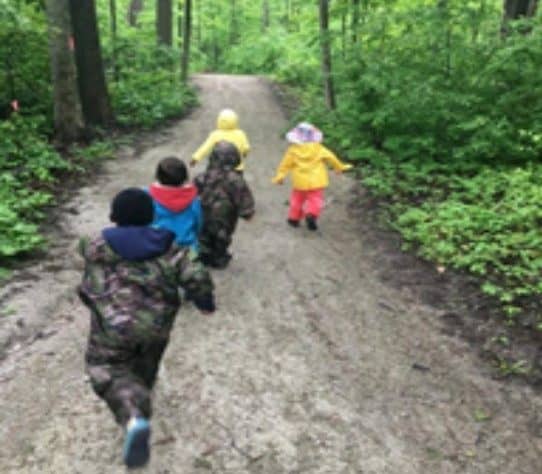
Who is John the Snail and When Can We Meet Him? Parent Perspectives on Children’s Engagement in a Forest Nature Program
Thank you to Louise Zimanyi and Olga Rossovska, Professors of Early Childhood Education at Humber College, for providing this post.
Two 150-year old crack willow trees surrounded by 250 acres of Carolinian forest, one of Canada’s most biologically diverse ecosystems, are the heart of The Willows forest nature program for children at the Child Development Centre at Humber College in Toronto.
The Willows is located within the traditional and treaty lands of the Mississaugas of the Credit and affords opportunities for children to share the forest, meadows and ponds with chickadees, deer and turtles. Through multi-sensory explorations, observations and wondering, in all seasons and weather, children not only learn the names of plants, animals and creatures, they also learn their stories.
Forest nature programs are about giving children more daily and direct sensory experiences of the natural world. This is at a time when more people are living in cities, where there are fewer green spaces and families are spending more time indoors and on screens. Children in forest nature programs experience the tremendous social, emotional and physical benefits of playing outdoors. Being outside in nature is good for mental health, improves mood and lessens anxiety.
While family engagement in nature is recommended in national and global documents related to increasing opportunities for active outdoor play in nature, there is limited research on parent perspectives about their children’s engagement in nature. The research aims of this study were to better understand parent perspectives on how time spent in nature and natural settings, including their own experiences with the natural world, might influence their child’s play, learning, and holistic development and connections in and to the natural world; and contribute to the literature and advocacy efforts on how best to support and advocate for responsive, inclusive land-based programs in the early years.
Through a survey and focus group, parents identified benefits of participation in a forest nature program including: increased time outdoors for their children and themselves, play confidence, risk-taking opportunities, improved health and wellness. Additional benefits identified included growing the seeds of environmental stewardship and reciprocity through nurturing compassion and care for other living creatures, and developing a respect for nature through awareness of Indigenous cultures, communities and knowledges. Parents reported that benefits far outweighed risks related to weather, insects and potential for injury.
The importance of experience in the early years, family time in nature and rethinking early care and learning and training programs all strongly support The Ontario Ministry of Education’s pedagogical guidelines for the early years and recommendations that advocate for active play in nature and outdoors, with its risks, as essential for healthy child development. The research contributes to the expanding literature and efforts on how best to collectively support and advocate for accessible land-based programs in the early years.
The full article can be accessed in the Journal of Innovation and Polytechnic Education here.
Louise Zimanyi is a Professor of Early Childhood Education, Faculty of Health Sciences and Wellness, Humber College and Doctor of Social Sciences Candidate, Royal Roads University. Her work and research explore how Indigenous and non-Indigenous educators can create ethical partnerships and space where Indigenous ways of knowing, doing and being shape early childhood practice and pedagogy. For more reading, see Wonder and Wisdom, Nature Stories: Children Experience the Seasons with Indigenous Knowledge Keepers and Children Connect to Aki/Earth through Anishinaabe Teachings
Olga Rossovska, RECE, MEd, is a Professor of Early Childhood Education in the Faculty of Health Sciences and Wellness at Humber College. Before becoming a college professor, she spent a decade as a toddler and preschool educator, leading environmental inquiry with children and colleagues. Her work alongside her colleagues’ (including Louise Zimanyi) was recently recognized by the Edward Burtynsky Award for Teaching Excellence in Environmental Education.
Read more of Olga and Louise’s work:
Rossovska, O., Zimanyi, L., Short, L., Singh, A., Beard, K., Casale, J., Silvestro, A. & Garcia, W. (in press). I speak Frog: Storying seasonal narratives of children’s common words. eceLINK Peer Reviewed Collection.

